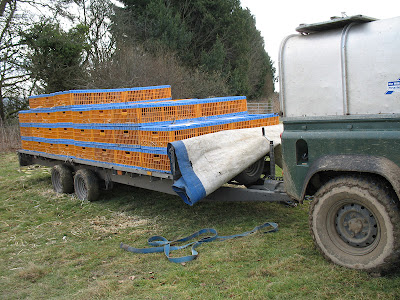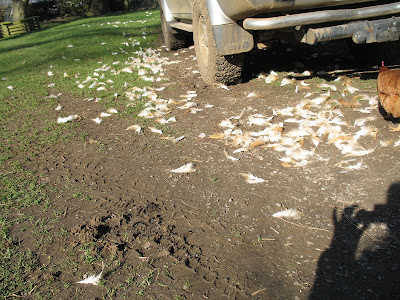On this shoot, we grow our own pheasants every year. This means hatching eggs, which means finding eggs to hatch in the first place. Hunting for wild nests would be 'Needle in a Haystack' territory and wouldn't guarantee the volume we need. (We don't just hatch for ourselves, but provide birds for other local shoots too.) So, we catch up hens and cocks - the mums and dads - and keep them in laying pens for the next four months, in order to collect their eggs.
So how does one catch the hens and cocks? Build a pheasant catcher, of course -
Or in our case, many pheasant catchers. The process is simple: wherever pheasants are feeding out of a bin (like the blue one in the above picture), build a square around it out of four panels, and cover the square with a net. Each panel should have four or so pop holes like this one -
It's just a cone made out of chicken wire, with the wide end on the outside, funnelling pheasants into the catcher. The narrow end is inside, which confuses the pheasants. They can't figure out how to go out the way they came in. And they want to come in because that's where their feed bin is.
We empty the catchers at dawn and dusk, to keep the birds safe from foxes that could break into it. The catchers aren't a fortress; in fact, we make constant running repairs with anything to hand - zip ties, baling twine, hog rings - just to keep escape holes plugged.
That would make even a hardcore bodger cringe. (Eh. I've seen worse, and it won the
Turner Prize*)
Anyhoo, the caught birds are put into crates -
Then released into large pens on our laying fields, 60 hens and 8 cocks to a pen -
I know, the laying pens look as shoddy as the catchers, but they're reinforced and ringed by electric fencing, to dissuade predators from digging under or climbing in. There's a low-tech drinker system (gravity-fed, made from a recycled tank and PVC pipes), and feed bins are filled manually, by humping bags of wheat and layers pellet in over your shoulder. Recycled tin A-frames give the hens somewhere to lay away from prying eyes, and a 'time out' area if they're getting too much male attention.
We've filled 21 pens already.
Other catching up - Mike is back home from the hospital now. His operations went very well, and he only stayed in for 5 days to recuperate. He's going to take a break from any more reconstructive surgeries for now and just focus on physiotherapy, which to him means working 7 days a week, and ignoring the pain. (I shout "Arbeit macht frei" at him when he leaves for work in the morning, but he dismisses my sarcasm.)
After 9 years with Mike, Underkeeper Pete has also moved on, to become Keeper Pete and head of his own shoot in Devon. We miss him already, and wish him the best. So, welcome Underkeeper Ian, who has just finished his final year at gamekeeping college. Of course, gamekeeper's wife Jen, is still here. I have to help with the catching up, after all.
*Actually, I'm a big fan of modern art and try to visit the Tate at least once a year.

















